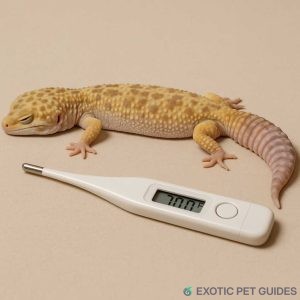🦎 Introduction
Reptiles like geckos often hide symptoms of illness, making it difficult for owners to catch problems early. Knowing the warning signs of poor health can make a huge difference in your gecko’s recovery. In this article, we’ll cover 10 key symptoms of illness, what they mean, and what actions you should take.
⚠️ 1. Loss of Appetite
A healthy gecko eats regularly. If your gecko suddenly refuses food for several days, it’s a red flag.

Possible causes:
- Improper temperature
- Stress
- Parasites
- Impaction
👉 Action: Check enclosure setup, offer favorite foods, and observe droppings.
💩 2. Abnormal Droppings
Healthy gecko poop should be firm, brown with a white urate. Diarrhea or runny stools can indicate parasites or infection.
👉 Action: Take a fecal sample to a reptile vet if abnormal droppings continue more than 2–3 days.
🐌 3. Lethargy and Weakness
Is your gecko sleeping more than usual or barely moving?
Possible causes:
- Cold temperatures
- Dehydration
- Calcium deficiency

👉 Action: Check basking zone temperature and hydration status.
❌ 4. Trouble Shedding
Geckos should shed cleanly in one or two days. If skin is stuck, especially around toes or tail, it’s a problem.
👉 Action: Add a humid hide, gently assist shedding with warm soaks or tweezers if safe.
🦴 5. Swollen Jaws or Limbs
Swelling may indicate Metabolic Bone Disease (MBD), a serious and preventable condition caused by calcium or D3 deficiency.
👉 Action: Begin calcium/D3 supplementation and consult a vet immediately.
👃 6. Discharge from Nose or Mouth
Bubbling at the nose, clicking sounds, or open-mouth breathing can indicate a respiratory infection.
👉 Action: Increase warmth slightly, isolate the gecko, and consult a reptile veterinarian.
👁️ 7. Sunken Eyes or Wrinkled Skin
This is a classic sign of dehydration. Geckos should have smooth, plump skin and clear eyes.

👉 Action: Mist enclosure more often and offer water or rehydration formula.
🪱 8. Visible Parasites
If you notice tiny white or black specks moving in feces, or if your gecko is losing weight rapidly, parasites could be the cause.
👉 Action: Collect a fresh fecal sample and take it to a vet for analysis.
🧠 9. Head Tilting or Loss of Balance
Neurological issues or severe infections may cause unusual movement or coordination problems.
👉 Action: Immediate vet attention is required.
📉 10. Sudden Weight Loss
Geckos, especially leopard geckos, store fat in their tails. A shrinking tail or visible bones may signal starvation or internal disease.

👉 Action: Review diet, check for stressors, and consult a vet if weight doesn’t return.
🧾 Quick Health Checklist
✅ Eats regularly
✅ Poops normally
✅ Active and alert
✅ Clear eyes and skin
✅ Sheds fully
✅ Proper weight
🧪 When to See a Reptile Vet
If any of these symptoms last more than 2–3 days, it’s time to consult a reptile-experienced veterinarian. Early diagnosis greatly improves recovery chances.
🐾 Conclusion
Being proactive with your gecko’s health is the best way to ensure a long and happy life. By watching for these 10 signs, you can catch problems early and give your pet the care it needs.